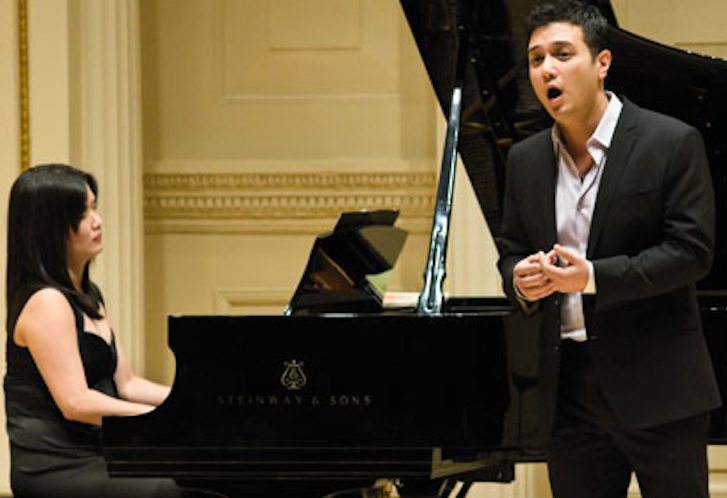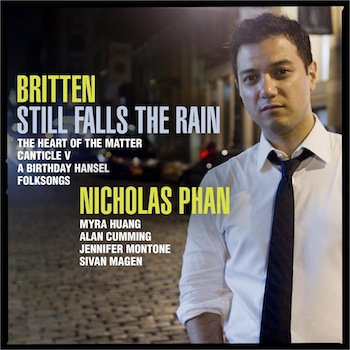Fuse Concert Review: Tenor Nicholas Phan and Pianist Myra Huang — A Dream Team
Tenor Nicholas Phan and pianist Myra Huang are a superb duo, and the pair’s recital was easily one of the highlights of this year’s concert season.
By Susan Miron
Now ending its second year, The Celebrity Series’s Debut Series features emerging artists, most just under the general music-listeners’ radar. The concert on Thursday night at the Longy school of Music in Cambridge featured the American tenor Nicholas Phan and pianist Myra Huang. The superb duo easily provided one of the highlights of this year’s concert season.
Phan, 34, already enjoys a well-established career in opera, concert and vocal recitals. The singer is closely associated with the music of Benjamin Britten (1913-1976), whose centenary last year brought a great deal of well deserved attention on this great British composer. Half of this recital was devoted to Britten and the other half to Schubert. The Schubert lieder mostly revolved around spring, while the Britten offerings were wintry wonders. It made for a perfect pairing, a tale of two seasons.
In interviews and on his blog Grecchinois, a French word connoting his Greek and Chinese heritage, Phan has confessed that for him that there is nothing more difficult than giving a solo recital. Why? Because there is nothing to hide behind, not even a costume: “In a recital, you are baring your soul, and there is direct contact with the audience. I get my thrill from that.” In his often thrilling recital last Thursday, the final time he will be performing this particular program in the U.S., Phan bared his soul from the first note of the Schubert through his two Britten encores. He is an unusually engaging singer; his ebullient personality shines through everything he sings. His dramatic delivery conveys hairpin changes of mood – so prevalent in Britten and Schubert – brilliantly. This vocal adroitness is, in no small part, due to his longtime accompanist extraordinaire, Myra Huang. She is a kindred spirit, a brilliant pianist who supports and adds depth to every word Phan sings.
Recitals with singers tend to be advertised as one-person affairs, but an amazing pianist like Huang, who co-creates the distinctive mood of each song, makes an enormous difference, especially when dealing with composers – such as Britten and Schubert – whose music is tightly melded to the poetry. Huang’s contribution to the glory of this recital was as an equal, and a terrific equal at that.
During the performance, Phan recalled being a young gay man in college in the late 1990s, a time when there were few gay role models in the world of classical music: “What was so inspiring about Britten and Peter Pears was the idea they could be gay, and it could be a positive thing, and not mean loneliness, illness, or depravity. They were inspiring pioneers.” It hit him about eight years ago that Britten’s music spoke with great immediacy to audiences because it embodied a perfect combination of head and heart. One of the results of this epiphany was Phan’s two masterfully performed Britten recordings, “Still Falls the Rain” and “Winter Words (both on AVIE), which were cited by critics.
Seven Schubert songs, full of nature imagery, were a welcome break from the still-wintry night outside. For Schubert, a song’s lyrics serve as a mirror of the singer’s feelings, the shifting conditions of his soul. An encounter with nature generates a succession of fragile moods, which are meticulously reflected in words and music. In Schubert’s songs, which changed the art form from house music to concert music, spring is all about longing and love lost. The long poem “Viola” (by Franz Adolf Friedrich von Schober) is an emotional tour de force that focuses on a field pansy that, born too soon, is killed off by frost. Phan and Huang gave the song the operatic treatment it deserved, full of tender moods and tempo changes.
Phan began singing Britten in earnest in 2008, and has been an energetic advocate for his songs, most of which were written for the tenor Peter Pears (Britten’s lifelong domestic and musical partner), with the composer serving as accompanist. It would have been helpful to have program notes for these offerings. This is the second time I’ve regretted that there were no notes at vocal recitals presented by the Celebrity Series. This is a considerable oversight.
Britten’s 1953 setting of eight poems of Thomas Hardy, “Winter Words” (Op. 52), was written in between his operas Gloriana and The Turn of the Screw. The song cycle suited Phan’s voice and personality perfectly. Phan pointed out that the series’ subjects are arranged in the form of a palindrome – looking back, young boys, train stations, and birth. The first part sketches corruption, the second half examines innocence, the latter a recurring theme in Britten’s vocal works.
Britten composed six sets of folk song arrangements for himself and Pears. In addition to the two sets of British folk songs, from which this recital drew, there were Scottish, French and Irish folk songs as well, the last dating from the last year of Britten’s life. I loved the duo’s performance of “Come you not from Newcastle?”, “Sally in Our Alley” (text by Henry Carey) and “The Poughboy,” all of which sparkled with wit and charm. “‘Tis the last rose of summer” (text by Thomas Moore) was riveting. Here, as in many of Britten’s songs, the keyboard part is quite harp-like (it works beautifully on that instrument). The first half of the tune is full of arpeggiated chords, the subject matter concerning a rose that is left to bloom alone: “Where thy mates of the garden lie scentless and dead.” Suddenly, the piano plays staccatto, and despair ensues, “Oh! Who would inhabit this bleak world all alone?”
For me, the gaunt melancholy beauty of this moment was among this recital’s many memorable high points.
Susan Miron, a harpist, has been a book reviewer for over 20 years for a large variety of literary publications and newspapers. Her fields of expertise were East and Central European, Irish, and Israeli literature. Susan covers classical music for The Arts Fuse and The Boston Musical Intelligencer. She is part of the Celtic harp and storytelling duo A Bard’s Feast with renowned storyteller Norah Dooley and plays the Celtic harp at the Cancer Center at Newton Wellesley Hospital.


